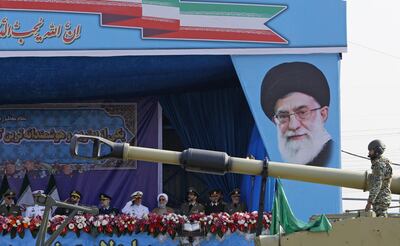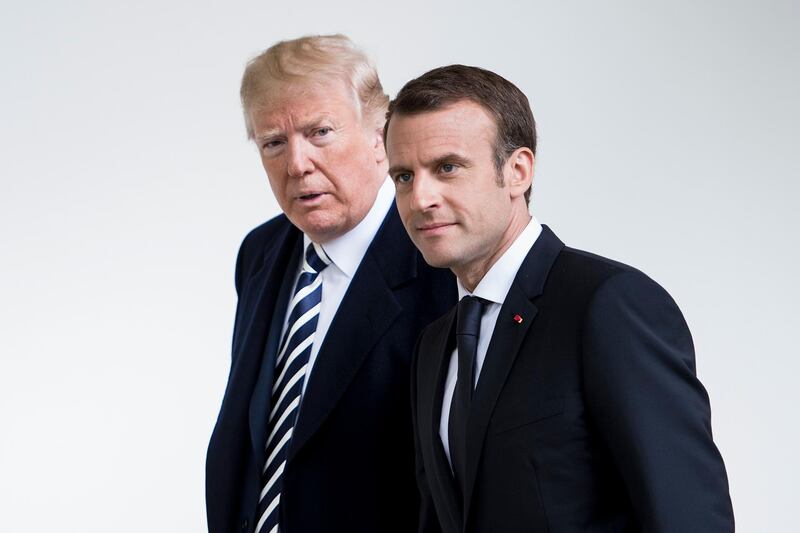Beyond the ceremony, handshakes and backslapping of their first meeting at the White House sit contradictions on an issue that Donald Trump and Emmanuel Macron have pledged to address: the Iran nuclear deal.
The US president first vowed to get rid of the agreement when he was running for election against Hillary Clinton, describing the deal as a disaster.
Iran has repeatedly pushed back, saying the US has shown bad faith and done much, economically, to frustrate the Islamic Republic’s efforts to profit from the accord. There have been grumbles on both sides but also an acknowledgement from the signatories that none of the deal’s main provisions have been breached. Yet the mood is souring.
Mr Macron, mirroring the views of many senior American officials, has urged Mr Trump to honour what the US signed up to — chiefly, sanctions relief — whatever his personal objections. Despite the French leader's best hopes, that outcome no longer seems tenable. At the centre of their push for a broader agreement is Iran's ballistic missile programme, which is not covered by the existing accord.
Iran cites the need for self defence as its justification for such missiles, yet the painting of slogans such as “Death to Israel” on to the side of projectiles does much to feed a different, more radical narrative. Iran’s role in the Middle East and its ability to project itself through proxies such as Hezbollah in Lebanon and Syria would also figure in any new talks.
Walking away from the present deal, explicitly or by slowly letting it die, is entirely possible on May 12, a deadline for Mr Trump to recertify or decertify sanctions. If he does the latter there will be consequences for the Middle East. It is here that the US president's apparent openness to a new deal with Iran, following Mr Macron's state visit, has gained attention. Whether it leads to a substantive change in policy is questionable.
The motivation for the current deal was the removal of a potential nuclear arms race, not the eradication of the missile programme. The remarkable achievement of the 2015 accord was that Iran, after years of enhanced enrichment of atomic material, agreed to anything.
_______________
Read more:
Iran condemns ‘businessman’ Trump after US and France call for a new nuclear deal
Iran rejects France's call to curb missile programme
______________
The bellicose rhetoric of Mahmoud Ahmadinejad, the Iranian president who had sped up the country’s nuclear activities, was replaced by a policy of engagement led by his more moderate successor, Hassan Rouhani. Nuclear centrifuges were dismantled and the country’s only nuclear reactor was filled with concrete, rendering it useless. Even with that better atmosphere the eventual deal — between Iran and the US, Britain, China, France, Russia plus Germany — took more than two years to negotiate. Mr Rouhani managed to hold off resentment within Iran’s hardline factions, chiefly the Revolutionary Guards and the powerful judiciary, to persuade Supreme Leader Ayatollah Ali Khamenei to agree terms with the West. It is extremely doubtful that he could do so again. Mr Rouhani has not entertained the possibility of a new negotiation for this very reason.

In Tehran, as in Washington, tension is rising. It is the Revolutionary Guards who control the missile programme, not Mr Rouhani, Yet even Iranian officials such as Foreign Minister Javad Zarif, the country's chief negotiator in 2015, are citing the possibility of restarting the nuclear work that stopped in January 2016, when the deal came into force. Iran has been heavily involved in the war in Syria through its need to maintain its supply route to Hezbollah, on Israel's border.
The difficulty now is that the comments of Mr Macron and Mr Trump to seek a new and better deal with Iran, run up against a major barrier: Mr Khamenei.
In Iran, all power in matters of policy lies with the supreme leader. Now aged 78, he was lukewarm on the subject of talks with the US in the first place. He agreed, reluctantly, because Iran was facing an economic crisis that threatened its stability. Then, as now, he makes public speeches that criticise the very same deal that Mr Trump sees fit to abandon. Somehow, it has remained in place. Yet there seems no way that Iran would agree to curbs on its missiles.
_______________
Read more:
Macron to Trump: we want to work on a new Iran deal
Can Macron’s White House visit save the Iran deal?
_______________
The contemporary reasoning is the argument that it has never undertaken to do so. The more substantive historical reason is that in 1980 when Iraq’s Saddam Hussein launched a war on Tehran, Iran had no missiles to fire back. After the war ended in stalemate, Iran started building its own weapons to ensure such a repeat would not come about. Similarly, Iran will do nothing to weaken its line to Hezbollah.
It is here that Mr Trump and Mr Macron’s words run out of road. Any negotiation depends on two sides and Iran sees no need to start such a process.





